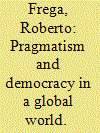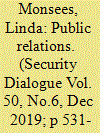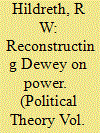| Srl | Item |
| 1 |
ID:
177540


|
|
|
|
|
| Summary/Abstract |
THE RAPID DEVELOPMENT of the nuclear industry in the 20th century, the widespread use of radioactive isotopes in medicine and in military programs, the usage of nuclear submarines, as well as the operation of radiochemical plants, factories, nuclear power plants, and scientific research centers all around the world are accompanied by a constant accumulation of radioactive waste (RW) and spent nuclear fuel (SF). Mishandling of RW and SF could possibly inflict significant damage on the whole planet, not merely a single nation. Thus, the question of placing RW and SF in storage is the main component of an environmental issue shared by the whole planet due to the use of nuclear energy.
|
|
|
|
|
|
|
|
|
|
|
|
|
|
|
|
| 2 |
ID:
155158


|
|
|
|
|
| Summary/Abstract |
This article discusses the advantages of a pragmatist theory of global democracy for understanding the political relevance of new phenomena such as the emergence of forms of private authority and transnational movements in tackling with global issues. The article shows in particular that the pragmatist notion of ‘publics’ offers promising insights and proves particularly promising for completing the transition from methodological nationalism to methodological cosmopolitanism that is required to understand new normative practices developing at the global level and to inquire into their conditions of validity. After having presented a basic outline of the pragmatist theory of democracy, I discuss the contribution of pragmatism to the critique of methodological nationalism and proceed then to examine and reject two alternative approaches to global politics – transnational public sphere theory and global representation theory – showing why they fail to overcome methodological nationalism. The last two sections explore private entrepreneurial authority in contexts of global governance and shows that pragmatism succeeds in explaining their political role, while the other two approaches fail.
|
|
|
|
|
|
|
|
|
|
|
|
|
|
|
|
| 3 |
ID:
170760


|
|
|
|
|
| Summary/Abstract |
This article contributes to the emerging literature on publics within critical security studies. Its particular focus is on contestation in the context of diffuse security technology. Contemporary security practices are characterized by diffusion and dispersion. As a result, contestation of security technology is also dispersed and diffuse and requires an account of publics that is sensitive to this aspect. The article conceptualizes ‘multiple publics’ as a mode of fundamental contestation of established political institutions. In order to do so, it discusses previous approaches to sociotechnical controversies and material participation. As a result of this discussion, it becomes apparent that we need a concept of publics that does not reduce political contestation to a pre-existing set of institutions. I develop a notion of publicness that emphasizes the way in which publics are embedded in societal struggles. This is achieved by reading John Dewey as a theorist to whom contestation is a vital part of democracy. It becomes possible to understand contestation against diffuse security practices – such as surveillance – as forms of emerging publics, even though they might not feed back into governmental decisionmaking.
|
|
|
|
|
|
|
|
|
|
|
|
|
|
|
|
| 4 |
ID:
092141


|
|
|
|
|
| Publication |
2009.
|
| Summary/Abstract |
One of the most enduring criticisms of John Dewey's political thought is that it is unsuspicious of power. This essay responds to this critique by advancing the claim that power is an integral but implicit element of Dewey's conception of human experience. Given Dewey's indirect treatment of power, this essay has two primary tasks. First, it reconstructs and develops an explicit conception of power for Deweyan pragmatism. Second, it evaluates the extent that Dewey's political and social philosophy is able to criticize power relations. Taken together, I aim to provide a more coherent and realistic defense of the political dimensions of Dewey's democratic theory. This defense moves Deweyan pragmatism toward a democratic politics that neither elides conflict nor evades power.
|
|
|
|
|
|
|
|
|
|
|
|
|
|
|
|